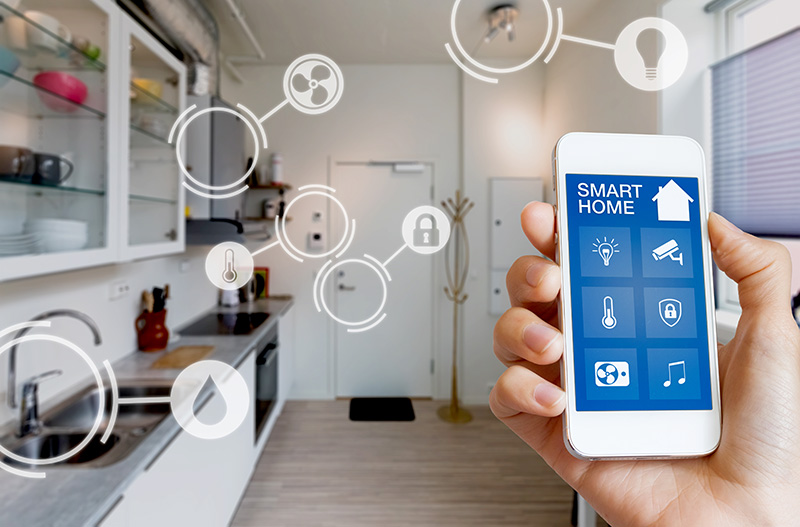Good parents worry about their children’s safety. For most, this centers on keeping toddlers away from medicine, sharp objects, electrical outlets and other physical dangers in the home. As children grow, parents can usually start worrying less about these things and focus on their children’s social and economic welfare.

But not parents of children with autism. They also grow concerned about their child’s social and economic welfare, but most likely don’t have the luxury of worrying any less about the physical dangers their child faces at home.
Regardless of their child’s age, these parents still sleep with one eye open for fear that they may slip out of bed and find a kitchen knife at 2 a.m. They still leap to their feet with every creek of the floor, worried that their child is wandering out the front door. They still can’t leave their child alone to go upstairs for five minutes without worrying that they may hurt themselves.
It’s parents like this that can benefit the most from the peace of mind that comes from reliable smart home technology.
Smart Home Technology and Autism
Here are several ways smart home technology can help:
Keep track of your child – You can always know where your child is with strategically placed interior smart door sensors that notify you on your mobile device when they open a door.
Get the rest you need and still keep an eye on your child – With an indoor camera in a bedroom, you can keep an eye on your child even at night by watching live video on your mobile device. This is especially helpful for a child who also suffers from seizures or other medical conditions. Camera footage of a seizure can also be a great tool for medical professionals to determine treatment and medications.
Protect your child from potential household hazards – You can protect and monitor your child by placing smart sensors on anything that opens and closes, like knife drawers, medicine cabinets or closets where you store cleaning supplies.
Monitor in-home therapy session and tutors – If your child receives in-home therapy, a camera is a great way to monitor activity during sessions. By observing sessions via camera, you can also learn from therapists without distracting your child or disrupting the session.
Learn how to better support your child – Viewing camera footage also provides a clear picture of how your child is progressing. While a child may be performing well during treatment, those behaviors don’t always stick. Being able to see what your child is accomplishing in session is empowering and informs your own interactions with your child. You can make requests and reinforce what your child is learning in therapy knowing what they’re capable of.
Manage the people coming and going – With in-home treatment therapists, tutors and caregivers coming in and out of your home throughout the day, a smart lock and doorbell camera make it easy for them to enter and leave, while still keeping your house safe and secure.
Preempt water disasters – If your child loves water, smart flood sensors can come in handy. It’s not uncommon for children with autism to turn on faucets and leave the water running. If they happen to plug the tub or sink, flood sensors in the bathroom or kitchen will notify you of the presence of water before damage occurs.
Prevent wandering – If your child wanders, smart window and exterior door sensors might be the most crucial smart home components you can install. It can take mere seconds for your child to disappear. With smart sensors, your wanderer will trigger an alarm and mobile device notification when they try to exit your home. Paired with an outdoor camera on your home, you can even know which direction they headed should they make it out before you get to them.
Increasing Safety and Peace of Mind
Consider the King family. Breck King and her husband are the parents of four children, including their son Owen, who has autism and is prone to wander. On one occasion, Owen slipped away while Breck was tending to another child. Frantic, she began a feverish search through the neighborhood and called the police for support when she couldn’t find him.
Owen was eventually discovered wearing nothing but his diaper in the dirt in a neighbor’s backyard. Without understanding Owen’s condition nor seeing Breck’s frantic and determined search for her beloved son, the concerned neighbors reported the Kings to protective services for child neglect. This added additional heartache and pain to an already stressful situation for the Kings. Unfortunately, their story isn’t unique – it’s shared by many parents of children with autism.
Now listen to Breck’s comments after living with smart home technology:
“It’s been life-changing. For the first time since before Owen’s diagnosis, I can have somewhat of a normal role as a mom. I mean, I’m able to cook dinner now. Life was really scary before our smart home system.”
A smart home system isn’t the answer to every challenge parents of children with autism face, but with cameras, door and window sensors and other smart devices, it certainly can help them find some ever-so-needed peace of mind.





